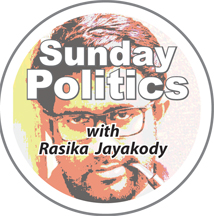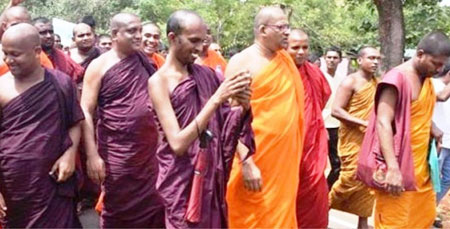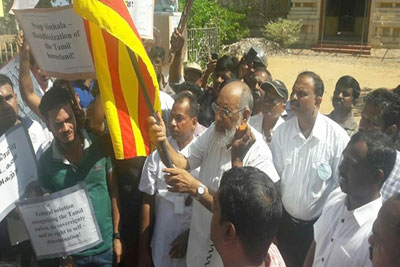Northern agitation provokes racism in South
 Radicalisation
of Tamil politics is turning out to be a critical problem for the
country’s political sphere, as the government has already embarked on a
comprehensive mission to bring about reconciliation and accountability. Radicalisation
of Tamil politics is turning out to be a critical problem for the
country’s political sphere, as the government has already embarked on a
comprehensive mission to bring about reconciliation and accountability.
This trend aims to derail the government’s plans for reconciliation,
while causing fear and suspicion among Sinhala-Buddhist sections in the
South. This may trigger a political resistance in the South against
attempts toward reconciliation and accountability, while driving the
North in the direction of ‘extremism’. It has now reached a point where
the government has to take the bull by the horns and deal with the
problem, without trying to find easy escape routes.
Northern Province Chief Minister C.V. Vigneswaran, a former Supreme
Court judge, rides the crest of this communalist wave in the North. When
the Tamil National Alliance fielded him as the Chief Ministerial
candidate at the Northern Provincial Council election, many believed he
would bridge the gap between the North and the South, as he had a proven
track record in the country’s judiciary. He was heavily backed by TNA
Leader R. Sampanthan, M.A. Sumanthiran and the seemingly moderate bloc
in the TNA camp.
In fact, the hardline bloc of the TNA backed Mavai Senathirajah for
the position, claiming the Colombo-born Vigneswaran was a bad choice for
the Chief Ministerial candidacy. Therefore, the group supporting
Vigneswaran had to lobby hard to make Vigneswaran the Chief Ministerial
candidate as the retired Supreme Court judge, at that point, seemed to
be the ‘man of the moment’.
 |
|
Vigneswaran’s conduct also
gave an opening for the BBS organization to make a dramatic
re-entry into the country’s political sphere |
However, after his ascension to the Chief Minister’s office,
Vigneswaran did a somersault by projecting himself as an ‘alternate
leader’ in the TNA, appealing to the extremist elements in the North. He
had no qualms about aligning himself with those advocating extremism in
terms of the north and east problem. They were the same groups that
vehemently opposed Vigneswaran’s candidacy, when the TNA decided to
field him for the Northern Provincial Council election.
Vigneswaran’s first drastic step was the setting up of the Tamil
People’s Council in December, last year, to counter the seemingly
moderate path taken by the TNA leadership, after January, last year. The
TPC was projected as an alternative to the TNA and Vigneswaran suddenly
became the new hero of the Tamil radicals.
Former Parliamentarian Suresh Premachandran, Gajendrakumar
Ponnambalam of ACTC, Senior ITAK vice president Prof. S. Sittambalam,
Northern Province Councilor Sivanesan alias Bavaan of PLOTE, Dr.
Poopalan Lakshman of the Jaffna Hospital, Batticaloa Civil Society
Secretary, T. Vasantharajah and N. Vijayasuntharam Editor of ‘Valampuri’
newspaper published in Jaffna were present at the inaugural meeting of
the Tamil People’s Congress. They were critical of the TNA saying the
party was cozying up to ‘Southern politics’, deviating from the Tamil
cause. It was clear, from the outset, that the TPC’s objective was to
confine politics in the North to a communal cell.
 |
|
The ‘Elugha Tamil’ rally
was organised by the TPC, led by Vigneswaran. Several other
hardcore members of the TNA and other Tamil organisations were
also present at the event. |
‘Eluga Tamil’, a rally that stirred up a hornets’ nest, in North as
well as in the South, was the latest manifestation of the TPC’s
blatantly communalist objectives.
Ideologically displaced
The rally was organised by the TPC, led by Vigneswaran. Several other
hardcore members of the TNA and other Tamil organisations were also
present at the event, showing their solidarity with the cause. The rally
was a clear indication that Vigneswaran did not have much faith in the
idea of reconciliation, as it could turn him into an Ideologically
Displaced Person (IDP) in politics.
The Chief Minister has now realized that his political future depends
on the manner in which he capitalizes on the rift between the Sinhalese
and Tamil communities. That is exactly why the Chief Minister is
attempting his best to fan communal flames in Jaffna, with the support
of several extremist politicians in the province. This makes Vigneswaran
and Mahinda Rajapaksa two sides of the same coin.
The rally raised awareness about several key demands of the Council,
including what they termed as “ongoing militarisation and State
sponsored Sinhala colonisation of the Tamil homeland, the need for an
international investigation into mass atrocities committed against the
Tamil people, the continued detention of Tamils under the Prevention of
Terrorism Act and the need for a political solution based on a federal
model which recognises the Tamil nation and its right to
self-determination.”
After the rally, the TPC made a lengthy public declaration, outlining
their demands. The declaration, inter alia, called fora “federal
solution based the constitutional proposals submitted by the Tamil
People’s Council (TPC) be adopted to ensure non-recurrence of the direct
and indirect repercussions described above, of the war, and as a
solution to the Tamil National question.”
“Although this government has assured the international community
that the proposed Third Republican constitution of Sri Lanka will bring
about a resolution to the Tamil National question, the President and
Prime Minister of Sri Lanka continue to stress that unitary character of
the Sri Lanka and the pride of place afforded to Buddhism will not be
altered in the constitution,” it said.
“We strongly believe that this government is attempting to force
minimal power devolution within a unitary State on the Tamil people.
We also believe that the government is attempting to hurriedly pass
the proposed constitution in Parliament and win the approval of this
minimalistic constitution at a referendum, with the support of the
majority of the Tamil people.
This strategy, we believe, will enable the government to proclaim
that it has solved the Tamil National question through the proposed
Third Republican Constitution,” it also added.
Connection
The TPC’s attempt took a violent turn when some of its participants
and supporters pelted stones at housing quarters used by Sathosa
employees. Many shops in the area were closed to show support to the
protest, but the Sathosa outlet in Kilinochchi remained open. The
quarters used by the Sathosa employees came under attack a few hours
after the protest and law enforcement authorities suspected that there
was a direct connection between the two events.
Although the Chief Minister publicly claimed that the protest had
nothing to do with communalism, his conduct came under heavy criticism
from many sections, including some front-line members of his own party.
Among them was M.A. Sumanthiran, who, at one point, strongly backed
Vigneswaran when the latter was fielded by the TNA as the Chief
Ministerial candidate.
Sumanthiran, speaking to the BBC Sandeshaya said, it was
‘inappropriate’ to launch a protest march at a time when the party was
holding discussions with other political parties in the country on the
proposed new Constitution.
He directed his criticism at the TPC, led by Vigneswaran, for
attempting to derail their engagement, with regard to the new
constitution.
Sumanthiran, while distancing his party from the Northern Province
Chief Minister’s initiative, stressed that the TPC supporters had
launched the protest disregarding his party’s advice and the TNA had no
part in it.
Such protest, he said, could create misunderstandings between the
Sinhalese and Tamil communities.
“The Tamil National Alliance is committed to finding a just and fair
solution for the Tamil community through democratic means and
constitutional reforms,” he said, adding that the TNA had already
embarked on this process.
He said this could be fulfilled through the Constitutional Council
which is represented by all political parties.
Racism
Apart from the TNA stalwarts, many other political parties in the
South, including several minority parties, lashed out at Vigneswaran
over the Elugha Tamil controversy.
Minister Mano Ganesan, who has earned a reputation as an outspoken
Tamil politician, said the rally would do little to help the
government’s plans for ethnic harmony. UNP General Secretary Kabir
Hashim too was quick to condemn the statement by the Northern Province
Chief Minister.
A senior of the SLFP and cabinet minister Nimal Siripala de Silva
launched a scathing attack on the Chief Minister saying the latter
attempting to incite racism by inviting people to the streets.
“The Chief Minister must not make this kind of remarks that will
encourage extremists in the North agitating for a separate state and
those in the South who are attempting to create fear psychosis over
resurgence of the LTTE. This government, I must say, will not tolerate
such attempts,” de Silva, a staunch supporter of President Sirisena,
said, addressing a press conference in Colombo.
Boycott
‘I cannot understand why a man of his calibre, a retired Supreme
Court judge, is attempting to strengthen and support extremism,’ the
Minister said, asserting that the SLFP, a key stakeholder of the
government, would allow the formulation of a Federal constitution.
Meanwhile, the Chief Minister’s conduct has created a wide gap
between the radical and relatively moderate elements in the TNA. It can
be assumed that Vigneswaran’s group will also move in the direction of
forming a separate party, breaking away from the TNA. However, at this
point, the TPC prefers to function as a front organization, without
taking up the role of a new, radical political party. This equation will
probably change when the government announces the Provincial Council
election for the North.
However, in another interesting turn of events, Vigneswaran was the
notable absentee at the opening ceremony of the National Sports Festival
2016, held at the Duraiappah Stadium in Jaffna. Many said Vigneswaran
had decided to boycott the event.
Speaker Karu Jayasuriya was the Chief Guest at the sports festival
and Vigneswaran was invited as a guest of honour.
However, NPC Chairman and several other provincial ministers were
present at the event, to encourage Sri Lanka’s national athletes.
Vigneswaran’s conspicuous absence at the sports event showed that the
Chief Minister did not want to engage with events promoting harmony and
reconciliation.
Vigneswaran’s conduct also gave an opening for the BBS organization
to make a dramatic re-entry into the country’s political sphere.
The BBS and representatives from a few other extremist Buddhist
organisations held a protest in Vavunia, on Friday, demanding action
against the Chief Minister.
BBS General Secretary Galagoda-aththé Gnanasara Thera and Sihala
Ravaya stalwart Iththakande Saddhathissa Thera were seen at the
forefront of the protest. This was the first public event organised by
the BBS as they went into a dormant phase of sorts after the Rajapaksa
family fell out of power, in January, last year.
This time, the Tamil community in the North and their provincial
administration were at the receiving end of the BBS’s scathing attacks.
During the protest, the BBS supporters threatened to ‘come back’ if the
provincial administration in the North continued its acts against the
Sinhalese community in the area.It was, one might say, a veiled threat
to replicate the Aluthgama attack against Muslims which sent across the
society, two years ago. It is, without doubt, a classic example on how
the Tamil racism feeds the Sinhala-Buddhist racism and supremacy. It is
all too evident that Vigneswaran and the Sinhala-Buddhist extremists are
the two sides of the same coin. This is why Vigneswaran’s conduct is no
different from that of former President Mahinda Rajapaksa, at this
juncture.
This situation may compel the government and the country’s civil
society to launch a concerted effort against racism and extremism. It is
now quite clear that racism and extremism will hamper the ruling
alliances’ grand plans for comprehensive political reforms.
In a context where many political parties, including the TNA, have
decided to positively engage with the reforms process, the
ultra-nationalist elements in the North and the South will be a stone in
the shoe for the government.
It was against this backdrop that the Public Representations
Committee on Constitutional Reform headed by Lal Wijenayake called on
Mahanayake of the Malwatte Chapter Ven. Thibbotuwawé Sri Sumangala Thera
to brief the latter about the ongoing process.
During the discussion, the Mahanayake Thera gave his inputs to the
Committee members who are in the process of preparing a final report on
constitutional reforms.
In his remarks, Thibbotuwawe Sri Sumangala Thera reiterated that good
characteristics of the present Constitution should be made entrenched
provisions, when the new constitution is being formulated. The
Mahanayake Thera opined that the unitary status of the country and the
right status and respect to Buddhism should remain intact when the new
constitution is being drafted.
The Mahanayake Thera said the Committee and the government will come
under flak from many quarters if these vital characteristics of the
present Constitution are omitted when drafting the new Constitution.
The Mahanayake Thera, going another step further, inquired from the
Committee representatives about public views on the abolition of the
Executive Presidency. The total abolition of Executive Presidency was a
key promise of President Maithripala Sirisena when he ran for
presidency, last year.
“It is impossible for the Committee to obtain views of each and every
person in the country but obtaining the views of a cross section of the
society representing various social strata is vital for the formulation
of the new Constitution,” the Mahanayake Thera said.
Wijenayake then presented a book containing views of a cross section
of the society on Constitutional Reforms. Sources close to the Committee
said it would also meet several other prominent figures in society to
make them aware of the ongoing process and gather their inputs.
They added that this would make the entire process transparent and
allay certain fears among some sections in the South over the
formulation of the new constitution. |

